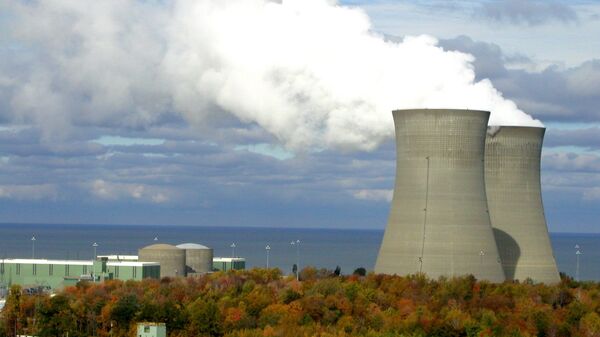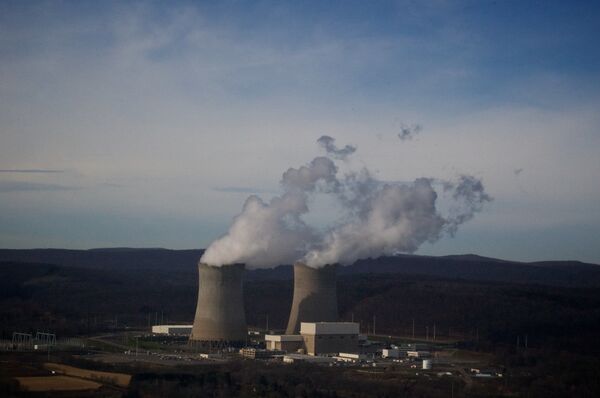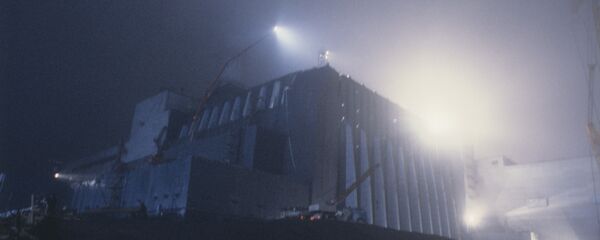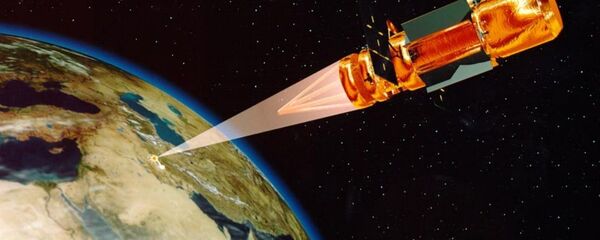Nuclear power is being touted as a key source of energy to help countries divest from the fossil fuels driving global warming and climate change. The UK government announced in 2011 that eight new nuclear powerplants will be constructed, all of them adjacent to previous powerplants. An estimated 19 per cent of the UK’s energy needs currently come from nuclear power, though this is predicted to rise to 33 per cent by 2035.
Professor Karl Grossman is an award-wining investigative journalist. He authored Cover Up: What You Are Not Supposed to Know About Nuclear Power and Power Crazy and is the writer and presenter of television programmes on nuclear power. Professor Grossman argues that nuclear power is too dangerous to offer a realistic long-term alternative to fossil fuels and that other options such as wind and solar already exist.
Sputnik: Explain what you think the key greatest strengths of nuclear power are.
Professor Karl Grossman: I do not think – indeed after decades of research and writing about nuclear power I am thoroughly certain – nuclear power has any strengths at all. As I begin my 1980 book, Cover Up: What You Are Not Supposed to Know About Nuclear Power,
“You have not been informed about nuclear power. You have not been told. And that has been done on purpose. Keeping the public in the dark was deemed necessary by the promoters of nuclear power if it was to succeed. Those in government, science and private industry who have been pushing nuclear power realised that if people were given the facts, if they knew he consequences of nuclear power, they would not stand for it.”
This continues today. Much of the fault, and I say this as a professor of journalism, involves the media and how much of it has been manipulated to swallow the lies of the nuclear promoters. If people knew the truth—as they must because this is a matter of life-and-death to people—they would insist that a stop be put to nuclear power.
Sputnik: Do you agree that nuclear power is a clean and renewable option for countries to shift away from energy sources which are accelerating global warming?
Professor Karl Grossman: The baloney peddled by the nuclear promoters for decades have included the claims that nuclear power would be “too cheap to meter” and would be safe – that lie demolished by the Three Mile Island, Chernobyl and Fukushima disasters. And now the new baloney is that nuclear power would be important in dealing with global warming. What the nuclear salespeople are not saying is that the “nuclear cycle” – mining, milling, fuel enrichment – is carbon-intensive and contributes to climate change and, in fact, nuclear plants themselves emit carbon, radioactive Carbon-14, at that.
To deal with global warming – and its cause, the burning of fossil fuels, coal, oil and gas – we must go to the safe, clean, green, renewable energy alternatives led by solar and wind. The big change since I wrote Cover Up in 1980, which included a chapter on the alternatives to nuclear power, is that those alternatives are now on the shelf, ready to be implemented, indeed, as I titled a TV programme I did on this a few years ago, Renewables Are More Than Ready.
Sputnik: Describe the risks associated with nuclear power plants.
Professor Karl Grossman: The risks – and, in fact, they are more than “risks,” they are inevitable occurrences – are many and huge. A major accident at a nuclear power plant will kill people on a massive scale as, since the Chernobyl catastrophe, health research on that disaster has shown. The book Chernobyl: Consequences of the Catastrophe for People and the Environment published by the New York Academy of Sciences based on medical data collected since the disaster show it resulted in the death of nearly one million people. Readers of this question-and-answer piece might go to my website, karlgrossman.com, and see on it my half-hour TV programme with an editor of that book, Janette Sherman, MD.
As to war, any nation with a nuclear power plant gains the material for making nuclear weapons. How did India get an atomic bomb in 1974? Canada supplied a reactor and the US Atomic Energy Commission provided heavy water for it under the US “Atoms for Peace” programme. From the reactor, India got the plutonium for its first nuclear weapon. Any nation with a nuclear facility can use the plutonium produced in it to build nuclear arms. As physicist Amory Lovins and attorney Hunter Lovins explain in their book Energy/War: Breaking the Nuclear Link: “All nuclear fission technologies both use and produce fissionable materials…Unavoidably latent in those technologies, therefore, is a potential for nuclear violence…Little strategic material is needed to make a weapon of mass destruction. A Nagasaki-yield bomb can be made from a few kilograms of plutonium, a piece the size of a tennis ball” and a nuclear plant “annually produces hundreds of kilograms of plutonium.” There must be, they say, “civil denuclearization.”
Sputnik: To what extent can these risks be managed?
Professor Karl Grossman: The risks, in fact, cannot be managed. When I first began investigating nuclear power in the 1970s, I was told by scientists at Brookhaven National Laboratory, established by the US Atomic Energy Commission largely to develop civilian uses of nuclear technology, that a minor accident might occur every two centuries or so but nuclear power plants were built with such redundancy that they were “safe.” Then came the Three Mile Island accident in 1979, and the Chernobyl catastrophe in 1986, and the Fukushima disaster in 2011. It isn’t a minor accident that might occur every two centuries or so -- there has been, and will be, as has been the record, major nuclear power plant catastrophes about every decade around the world.
Sputnik: Aren’t the designs of nuclear power plants much safer today than before? Haven’t lessons be learned?
Professor Karl Grossman: The designs of the “new, improved nuclear plants” don’t provide safety. It’s the radioactivity that’s the problem. As Admiral Hyman Rickover, the “father” of the US nuclear navy who was in charge of the construction of the first US nuclear power plant, Shippingport in the state of Pennsylvania, told a US Congressional committee in 1982, after he saw the light in regard to nuclear power, billions of years ago “it was impossible to have any life on Earth; that is, there was so much radiation on earth you couldn’t have any life — fish or anything.” This was from naturally-occurring cosmic radiation when the Earth was in the process of formation. “Gradually,” said Rickover, “about two billion years ago, the amount of radiation on this planet [...] reduced and made it possible for some form of life to begin.” Now, he continued, with “nuclear power we are creating something which nature tried to destroy to make life possible. Every time you produce radiation” a “horrible force” is unleashed. By splitting the atom, there is a recreation of the poisons that precluded life from existing. “And I think there the human race is going to wreck itself,” Rickover stated. This was Rickover, a key figure in nuclear power history, not Greenpeace. Radioactivity is the problem — unleashed when the atom is split. And it doesn’t matter whether it’s a General Electric boiling water reactor such as those that have erupted at Fukushima, or the Westinghouse pressurised water design, or [Soviet]-designed plants like Chernobyl, or the various “new, improved” nuclear plants being touted today, all nuclear power plants produce radiation and radioactive poisons.
Professor Karl Grossman: There is nothing more lethal than the radioactive poisons produced by nuclear power plants – and I say this after also extensive research into toxic chemicals that included writing a book. Plutonium, for example, is the most toxic of all radioactive poisons produced in nuclear power plants. A millionth of a gram is a fatal dose if inhaled. And, as noted above, a nuclear power plant produces hundreds of kilograms of plutonium every year. Moreover, this plutonium, Plutonium-239, has a “half-life” of 24,100 years and to measure the “hazardous lifetime” of a radioactive substance, one multiplies “half-life’ by between ten to twenty. In other words, Plutonium-239, once produced in a nuclear power plant, remains hot and radioactive for between 240,100 and 480,200 years.
Sputnik: Where does the fissile material for nuclear power plants come from?
Professor Karl Grossman: The mining of uranium is also part of the “cradle-to-grave” death cycle of nuclear power. The rate of lung cancer among miners of uranium is huge. And I have visited the Navajo Indian Nation in the United States where much of US uranium has come from and there observed the tragedy to the Navajo people. This is the situation anywhere in the world where uranium for nuclear power plants – and atomic weaponry, the other side of the nuclear coin – is mined.
Sputnik: How much radioactive material is available on the planet to fuel these power plants?
Professor Karl Grossman: In fact, there is a limit estimated now at just several decades before high-grade uranium ore will no longer exist on earth.
Sputnik: What are the key drawbacks, in your opinion, of countries continuing to depend on nuclear power?
Professor Karl Grossman: Any country which decides to use nuclear power is committing national suicide. It should also be noted that you don’t need the inevitable catastrophic accident or the issue of trying to keep lethal nuclear waste from life for millions of years, the operation of any nuclear power plant involves what are called “routine emissions” of nuclear poisons which impact on the communities around those plants. That’s why, as the Radiation and Public Health Project has long documented, there are clusters of cancer around nuclear power plants.
Sputnik: If we don’t use nuclear power to assist with shifting away from fossil fuels what can be used to replace it?
Professor Karl Grossman: “Renewables Are More Than Ready” was, as noted, the title of a television programme I wrote and presented on this. I have written many, many articles on this, too. They can be found through Google. Safe, clean, green, renewable energy technologies—led by solar and wind and there are many others—are here today to provide all the power we need, energy we can live with!





